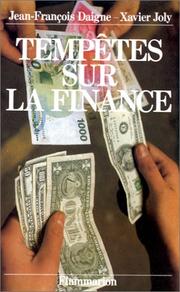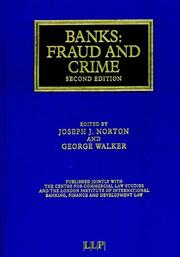| Listing 1 - 10 of 74 | << page >> |
Sort by
|

ISBN: 2080661213 Year: 1988 Publisher: Paris Flammarion
Abstract | Keywords | Export | Availability | Bookmark
 Loading...
Loading...Choose an application
- Reference Manager
- EndNote
- RefWorks (Direct export to RefWorks)
Capitalists and financiers --- Commercial crimes --- Investments --- Stockbrokers --- Stock exchanges

ISBN: 1859785506 Year: 2000 Publisher: London Llp Professional Publishing
Abstract | Keywords | Export | Availability | Bookmark
 Loading...
Loading...Choose an application
- Reference Manager
- EndNote
- RefWorks (Direct export to RefWorks)
Bank fraud --- Banking law --- Commercial crimes --- Criminal provisions
Book
ISBN: 9781119133124 9781119146834 Year: 2015 Publisher: London John Willey & Sons
Abstract | Keywords | Export | Availability | Bookmark
 Loading...
Loading...Choose an application
- Reference Manager
- EndNote
- RefWorks (Direct export to RefWorks)
Detect fraud earlier to mitigate loss and prevent cascading damage Fraud Analytics Using Descriptive, Predictive, and Social Network Techniques is an authoritative guidebook for setting up a comprehensive fraud detection analytics solution. Early detection is a key factor in mitigating fraud damage, but it involves more specialized techniques than detecting fraud at the more advanced stages. This invaluable guide details both the theory and technical aspects of these techniques, and provides expert insight into streamlining implementation. Coverage includes data gathering, preprocessing, model building, and post-implementation, with comprehensive guidance on various learning techniques and the data types utilized by each. These techniques are effective for fraud detection across industry boundaries, including applications in insurance fraud, credit card fraud, anti-money laundering, healthcare fraud, telecommunications fraud, click fraud, tax evasion, and more, giving you a highly practical framework for fraud prevention. It is estimated that a typical organization loses about 5% of its revenue to fraud every year. More effective fraud detection is possible, and this book describes the various analytical techniques your organization must implement to put a stop to the revenue leak. Examine fraud patterns in historical data Utilize labeled, unlabeled, and networked data Detect fraud before the damage cascades Reduce losses, increase recovery, and tighten security The longer fraud is allowed to go on, the more harm it causes. It expands exponentially, sending ripples of damage throughout the organization, and becomes more and more complex to track, stop, and reverse. Fraud prevention relies on early and effective fraud detection, enabled by the techniques discussed here. Fraud Analytics Using Descriptive, Predictive, and Social Network Techniques helps you stop fraud in its tracks, and eliminate the opportunities for future occurrence.
internet --- criminalite --- information --- communication --- Vaardigheden talenten communicatie communiceren feedback --- criminaliteit --- informatie --- communicatie --- Fraud --- Commercial crimes --- Statistical methods --- Prevention
Book

ISBN: 2807942776 9782807942776 Year: 2024 Publisher: Bruxelles Larcier Intersentia
Abstract | Keywords | Export | Availability | Bookmark
 Loading...
Loading...Choose an application
- Reference Manager
- EndNote
- RefWorks (Direct export to RefWorks)
Cette seconde édition augmentée et révisée propose une structure adaptée et prend en compte les dernières évolutions jurisprudentielles dont celles de fin 2023, en droit pénal fiscal notamment. Le premier titre rassemble les différents aspects procéduraux de la gestion du droit pénal des affaires. Il aborde, en particulier, les procédures judiciaires et administratives concurrentes ou parallèles à la procédure pénale classique lorsqu’il est constaté une infraction au droit des affaires ainsi que les pouvoirs des différents services d’inspection. Il a, par souci de cohérence, été inséré dans ce titre l’analyse de la question de la preuve et la transaction pénale. Une étude de la récolte transfrontalière de preuves électroniques, aspect important de la matière, a été ajoutée. Le droit pénal général est le deuxième titre, nécessairement devenu plus concis. La troisième partie relative au droit pénal spécial se penche sur les infractions propres au droit pénal des affaires en les subdivisant : infractions contre la foi publique, contre les biens, contre l’ordre fiscal, la criminalité informatique et les infractions relatives aux sociétés. Enfin, tout au long du travail de refonte de ce Manuel, les analyses proposées ont été mises à jour et certains textes ont été retravaillés sur le plan didactique afin de les rendre davantage accessibles et fluides. L’ouvrage sera de la sorte un outil encore plus utile pour l’apprentissage de cette matière par les étudiants ainsi que pour l’utilisation des praticiens.
Book
ISBN: 9789279136108 9279136100 Year: 2010 Publisher: Luxembourg Office des publications de l'Union européenne
Abstract | Keywords | Export | Availability | Bookmark
 Loading...
Loading...Choose an application
- Reference Manager
- EndNote
- RefWorks (Direct export to RefWorks)
Public law. Constitutional law --- Criminal law. Criminal procedure --- Fraud --- Commercial crimes --- Law enforcement --- Fraude --- Infractions économiques --- Lois --- Prevention. --- Public opinion. --- Prévention --- Application --- Opinion publique --- Prevention --- Public opinion --- Infractions économiques --- Prévention --- europe --- fraude --- communicatie --- douane --- europa --- communication --- Fraud - European Union countries - Prevention --- Commercial crimes - European Union countries - Prevention --- Law enforcement - European Union countries - Public opinion

ISBN: 2802710621 9062155804 9782802710622 Year: 1998 Publisher: Bruxelles Bruylant
Abstract | Keywords | Export | Availability | Bookmark
 Loading...
Loading...Choose an application
- Reference Manager
- EndNote
- RefWorks (Direct export to RefWorks)
Criminal law. Criminal procedure --- European Union --- Commercial crimes --- Criminal law --- Customs administration --- Infractions économiques --- Droit pénal --- Douanes --- Law and legislation --- Droit --- Fraud --- 34 <4> --- -Commercial crimes --- -Fraud --- -351.82 --- fraude --- fraude fiscale --- droit communautaire --- droit penal --- ce --- Commercial fraud --- Deceit --- Misrepresentation (Crime) --- Deception --- Torts --- Hoaxes --- Impostors and imposture --- Corporate crime --- Crimes, Financial --- Financial crimes --- Offenses affecting the public trade --- Crime --- Rechtswetenschappen.--Europa --- fiscale fraude --- gemeenschapsrecht --- strafrecht --- eg --- 34 <4> Rechtswetenschappen.--Europa --- Infractions économiques --- Droit pénal --- 351.82 --- European Union countries --- Law --- Belgium --- Commercial crimes - European Economic Community countries --- Fraud - European Economic Community countries --- Commercial crimes - Belgium --- Fraud - Belgium --- Comité permanent de Contrôle des services de renseignement et de sécurité (Comité permanent R) --- Vast Comité van Toezicht op de inlichtingen- en veiligheidsdiensten (Vast Comité I) --- Secteur financier --- Infractions économiques et financières --- Droit européen --- Droit pénal (droit européen)
Book
ISBN: 9782804497194 Year: 2019 Publisher: Bruxelles Larcier
Abstract | Keywords | Export | Availability | Bookmark
 Loading...
Loading...Choose an application
- Reference Manager
- EndNote
- RefWorks (Direct export to RefWorks)
Le présent Code ambitionne de constituer l’outil de référence pour les praticiens de la lutte contre le blanchiment de capitaux et le financement du terrorisme. Il s’articule en trois pôles principaux : le blanchiment de capitaux, le financement du terrorisme et les sanctions financières. Chacun de ces pôles se subdivise en deux volets, préventif et répressif, qui intègrent les textes pertinents de droit belge, européen et international. Une attention particulière a été portée à l’approche fondée sur les risques, qui se trouve désormais au cœur des nouveaux instruments de lutte contre le blanchiment de capitaux et le financement du terrorisme.
Terrorism --- Terrorisme --- Money laundering --- Blanchiment de l'argent --- Commercial crimes --- Infractions économiques --- Economic aspects --- Codes --- Aspect économique --- witwassen --- terrorisme --- financiering --- kansspelen --- code pénal --- saisie --- blanchiment --- financement --- jeux de hasard --- strafwetboek --- beslag
Book
ISBN: 9789089772596 Year: 2011 Publisher: Heule UGA
Abstract | Keywords | Export | Availability | Bookmark
 Loading...
Loading...Choose an application
- Reference Manager
- EndNote
- RefWorks (Direct export to RefWorks)
Globale en grondige aanpak: Het werk bespreekt en analyseert, op basis van de bestaande rechtspraak en rechtsleer, alle constitutieve bestanddelen van het misdrijf van misbruik van vennootschapsgoederen, zowel op zichzelf als in hun onderlinge samenhang, mede rekening houdend met de inherent vennootschapsrechtelijke aspecten ervan. Na een bondlge situering van het misdrijf in het Belgische strafrecht, zowel vanuit de ratio legis van de strafbepaling als ten aanzien van de reeds voorheen bestaande vermogensmisdrijven, wordt grondig ingegaan op het personeel toepassingsgebied, de materiele constitutieve bestanddelen en het moreel element. Daarnaast wordt aandacht besteed aan de bestraffing, de verjaringsrechtelijke aspecten en de burgerlijke vordering, met inbegrip van enkele samenhangende vermogensgerelateerde aansprakelijkheidsrisico's voor bestuurders. Tot slot worden enkele bijzondere toepassingen besproken (misbruik van vennootschapsgoederen en intragroepsverrichtingen; corporate opportunities; bestuurdersvergoedingen;...). Praktijkgericht: Het werk brengt duidelijkheid in onder meer volgende kwesties: - Kent de strafbare deelneming slechts een beperkte toepassing (met name enkel in hoofde van buitenstaanders van de vennootschap), door de gelding van de wettelijke toerekening t.a.v. de daders van het misdrijf? - Is misbruik van vennootschapsgoederen door omissie mogelijk? - Is een effectief geleden schade (in de zin van de artikelen 1382-1383 B.W.) vereist of volstaat de blootstelling aan een risico op schade? - Wat is de precieze draagwijdte van het begrip “betekenisvol”? - Kunnen vennoten en/of schuldeisers zich op ontvankelijke wijze burgerlijke partij stellen uit hoofde van misbruik van vennootschapsgoederen en, zo ja, voor welke schade?”
Criminal law. Criminal procedure --- Company law. Associations --- Belgium --- vennootschapsrecht --- fraude --- droit des societes --- Abus de biens sociaux --- Corporations --- Criminal provisions --- Misbruik van vennootschapsgoederen --- Commercial crimes --- Infractions économiques --- Entreprises --- Corrupt practices --- Pratiques déloyales --- E-books

ISBN: 0881323705 Year: 2004 Publisher: Washington, D.C. Institute for International Economics
Abstract | Keywords | Export | Availability | Bookmark
 Loading...
Loading...Choose an application
- Reference Manager
- EndNote
- RefWorks (Direct export to RefWorks)
Money laundering --- 363.25968 --- blanchiment --- fraude --- international --- monnaie --- munt --- Laundering of money --- Money washing --- Washing of money --- Prevention --- witwassen --- internationaal --- geld --- Money. Monetary policy --- Criminal law. Criminal procedure --- United States --- Commercial crimes --- United States of America
Multi
ISBN: 9789400016613 9400016611 Year: 2023 Publisher: Antwerpen Larcier Intersentia
Abstract | Keywords | Export | Availability | Bookmark
 Loading...
Loading...Choose an application
- Reference Manager
- EndNote
- RefWorks (Direct export to RefWorks)
Dit handboek geeft een grondige en actuele analyse van de consumentenbescherming en marktpraktijken. De wetgeving met inbegrip van de recentste evoluties zoals de omzettingswetgeving van de Omnibusrichtlijn en Boek XIX Wetboek van economisch recht, alsook de meest relevante rechtspraak en rechtsleer worden in de analyse verwerkt.De algemene bescherming bij handelspraktijken b2c en b2b (m.i.v. parasitaire concurrentie, misbruik van economische afhankelijkheid en bedrijfsgeheim), bij de bijzondere promotionele praktijken en bij vergelijkende reclame vormt een eerste deel. Vervolgens komt de bescherming van de consument als contractpartij uitvoerig aan bod: oneerlijke bedingen, consumentenkoop (goederen en digitale inhoud), verkoop op afstand en verkoop buiten de verkoopruimte, alsook de invordering van schulden. Verder gaat aandacht naar de financiële consument (o.m. kredieten, betalingsdiensten), de consument als reiziger (pakketreis, vlucht) en de consument als slachtoffer (productaansprakelijkheid). Een analyse van private handhavingsregels rondt het boek af.
Economic law --- Belgium --- bescherming van de consument --- concurrentiebeperking --- misbruikclausule --- economisch delict --- Consumer protection --- Consommateurs --- Antitrust law --- Concurrence --- Commercial crimes --- Infractions économiques --- Law and legislation --- Protection --- Droit --- Trade regulation --- Commerce --- Réglementation
| Listing 1 - 10 of 74 | << page >> |
Sort by
|

 Search
Search Feedback
Feedback About UniCat
About UniCat  Help
Help News
News